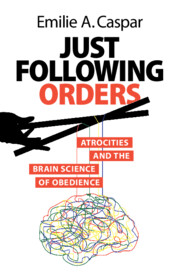Book contents
- Just Following Orders
- Just Following Orders
- Copyright page
- Contents
- Figures
- Preface
- Acknowledgments
- Introduction: Understanding Genocide as a Means to Prevention
- Chapter 1 Listening to the Perpetrators of Genocide
- Chapter 2 A Brief History of the Experimental Research on Obedience
- Chapter 3 How Do We Take Ownership over and Responsibility for Our Own Actions?
- Chapter 4 Moral Emotions under Obedience
- Chapter 5 Just Giving Orders? In the Brains of Those Who Command
- Chapter 6 Desolation Is Everywhere
- Chapter 7 Conclusion: How Ordinary People Stand Up against Immorality
- Epilogue: A Hopeful Horizon
- References
- Index
Chapter 7 - Conclusion: How Ordinary People Stand Up against Immorality
Published online by Cambridge University Press: 25 July 2024
- Just Following Orders
- Just Following Orders
- Copyright page
- Contents
- Figures
- Preface
- Acknowledgments
- Introduction: Understanding Genocide as a Means to Prevention
- Chapter 1 Listening to the Perpetrators of Genocide
- Chapter 2 A Brief History of the Experimental Research on Obedience
- Chapter 3 How Do We Take Ownership over and Responsibility for Our Own Actions?
- Chapter 4 Moral Emotions under Obedience
- Chapter 5 Just Giving Orders? In the Brains of Those Who Command
- Chapter 6 Desolation Is Everywhere
- Chapter 7 Conclusion: How Ordinary People Stand Up against Immorality
- Epilogue: A Hopeful Horizon
- References
- Index
Summary
This chapter focuses on the individuals who actively worked to protect and save members of targeted groups during genocides, often at great personal risk. By presenting sociological, psychological, and neuroscience research designed to understand better the profile of those who risked their lives to rescue strangers in times of war, this chapter asks what makes this small subset of the population react differently than others. By combining research and interviews with rescuers, the chapter shows that both individual processes and environmental factors contribute to risking one’s own life to rescue threatened human beings. People who engaged in rescue efforts during a particular event came from a range of different backgrounds, and no single factor can be reliably used to predict why they chose to help. Some rescuers were motivated by their religious or moral beliefs, while others were motivated by empathy or a desire to protect. The chapter also argues that even though rescuers are not numerous, they are nonetheless a living examples that another choice is possible, and that human beings may find the strength to overcome hateful propaganda. This raises hope of developing efficient interventions aimed at reducing susceptibility to blind obedience.
- Type
- Chapter
- Information
- Just Following OrdersAtrocities and the Brain Science of Obedience, pp. 195 - 219Publisher: Cambridge University PressPrint publication year: 2024

